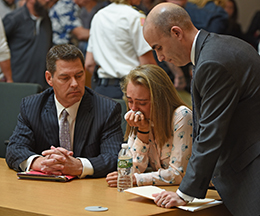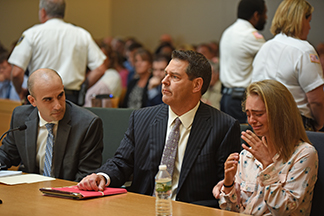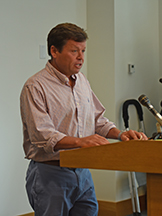
Michelle Carter cries after being found Guilty of involuntary manslaughter in the suicide of Conrad Roy III. Her attorney Joeseph Cataldo is seated next to her, and defense attorney Cory Madera is at left. Photo by Glenn C. Silva/Fairhaven Neighborhood News
By Beth David, Editor
The verdict is in. Judge Lawrence Moniz on Friday, 6/16, pronounced Michelle Carter, 20, of Plainville, Mass., guilty of involuntary manslaughter for her constant goading via text messages, phone calls and other electronic media, of Conrad Roy III to kill himself.
Mr. Roy, 18, was found by Fairhaven police in the KMart parking lot on July 13, 2014, in his pickup truck with a spent gas-powered water pump in the back seat of the crew-cab.
The young man had been missing since the night before, and police had started looking for him that day after his mother, who was living in Fairhaven at the time, filed a missing person’s report.
The trial, which ended on Tuesday, laid bare the inner workings of the minds of two very troubled teens. It also shone a light on the electronic communication habits of teens in 21st century America, and the dangers that lie therein.
Ms. Carter was visibly shaking from the moment she walked into court on Friday. First, it seemed she was shaking with relief when Judge Moniz seemed to be leaning towards acquittal, then she clearly shook and cried with the news that she had been found guilty of the charges.
In a verdict that was soundly criticized by the American Civil Liberties Union, Judge Moniz said that Ms. Carter’s actions, and her failure to act, caused Mr. Roy’s death, even though her actions were limited to words, as she was nearly 50 miles away at her home in Plainville, Mass.
Judge Moniz split the evidence into three components: the period of June 29, 2014, until July 12, when Mr. Roy died; second, was the time period immediately after that, including phone and text activity; and third, all the rest.
Her actions, through text messages and phone calls in that first time period, said Judge Moniz, constituted “wanton and reckless conduct” and a “serious disregard of the well-being of Mr. Roy.”
Judge Moniz said the state had not, however, proven that those actions caused Mr. Roy’s death.

Michelle Carter reacts as she listens to Judge Lawrence Moniz before he announces his verdict on Friday, 6/16/17 in Taunton. Her attorney Joeseph Cataldo is seated next to her, and defense attorney Cory Madera is at left. She was found guilty of involuntary manslaughter in the suicide of Conrad Roy III. Photo by Glenn Silva/Fairhaven Neighborhood News
Then in a twist, Judge Moniz said Ms. Carter’s other actions did prove her culpability in the death.
He said although Mr. Roy “took significant action,” to commit suicide, he did leave the vehicle.
He “breaks that chain of self causation,” said the judge, which was consistent with his previous attempts at suicide.
“He takes himself outside of the toxic environment it had become,” said the judge.
In 2012, shen he tried to drown himself, he literally sought air, said the judge and told a parent and received treatment. In a subsequent attempt by taking pills, he told a friend, who called for assistance.
When he exited the truck, said the judge, Mr. Roy “literally sought fresh air.”
“That Mr. Roy may have tried and maybe succeeded another time after July 13 of 2014,” to kill himself, said the judge, “is of no consequence to this court’s deliberations.”
He also said that the “legal principles” involved in the case are not “novel,” as some have suggested, and cited two cases. In one case, Commonwealth vs. Bowen, from 200 years ago in Hampshire County in Mass., a man was scheduled to be publicly hanged by the state for murdering his father. He was talked into killing himself in his cell by the man in the next cell just six hours before the scheduled execution.
Judge Moniz quoted from the case: “Though under sentence of death [he] is cheered by hope to the last moment of his existence.”
He said that when Ms. Carter realized that Mr. Roy had exited the truck, she instructed him to get back in, “well knowing all of the feelings he has exchanged with her, his ambiguity, his fears, his concerns.”
The judge said that instructing Mr. Roy to get back into the truck constituted “wanton and reckless conduct,” by Ms. Carter, creating a situation where there is a “high degree of likelihood that substantial harm will result to Mr. Roy.”

Michelle Carter reacts as she listens to Judge Lawrence Moniz before he announces his verdict on Friday, 6/16/17. Photo by Glenn Silva/Fairhaven Neighborhood News
Ms. Carter knew that Mr. Roy had followed her instructions about the water pump, how to use it to kill himself, where to place it, and where to park, etc. She even tells a friend that she could hear him coughing and could hear the water pump, and it was very loud. The judge said he found “independent corroboration” of that from the pictures taken at the scene and the placement of the water pump in the truck.
The judge also quoted from another case, Commonwealth vs. Levesque, the case of the homeless couple who started a fire that resulted in the deaths of six Worcester firefighters.
Judge Moniz quoted that case which stated that a person has a duty to act if one’s own actions “created a life threatening risk to another.”
“Knowing that Mr. Roy is in the truck, knowing the condition of the truck, knowing, or at least having a state of mind that 15 minutes would pass, Miss Carter takes no action in the furtherance of the duty that she has created by instructing Mr. Roy to get back into the truck,” he said.
The judge cited Ms. Carter’s own texts to friends that she did not call police or Mr. Roy’s family, even though she knew his location and had phone numbers for his mother and his sister.
“She called no one,” said Judge Moniz. “And finally, she did not issue a simple additional instruction: Get out of the truck.”
Judge Moniz then stated that “consequently,” he found the state had made its case that Ms. Carter’s actions and her failure to act, “where she had a self-created duty to Mr. Roy since she had put him into that toxic environment, constituted each and all, wanton and reckless conduct.”
He also found that the state had proven that her conduct “caused the death of Mr. Roy.”
Judge Moniz dismissed outright the argument made by psychiatrist Peter Breggin that Ms. Carter was “involuntarily intoxicated” due to her psychiatric medications.
“The court did not find that analysis credible,” was the Judge’s curt explanation.
He then asked Ms. Carter to rise and pronounced her guilty of Involuntary Manslaughter.

Conrad Roy Jr. makes a statement to the press after Michelle Carter was found guilty of involuntary manslaughter in the death of Mr. Roy’s son, Conrad Roy III. Photo by Glenn C. Silva/Fairhaven Neighborhood News.
After the ruling, the Carter family and the prosecution addressed members of the press briefly.
Mr. Roy’s father, Conrad Roy, Jr., spoke for the family, simply saying: “On behalf of our entire family, I would like to say how thankful we are to Judge Moniz and the prosecution team, mainly Katie Rayburn, Maryclare Flynn, and Scott Gordon, and the Fairhaven Police Department and the Massachusetts Police.
“This has been a very tough time for our family. and we’d like to just process this verdict, that we’re happy with. Thank you.”
Prosecutor Katie Rayburn also read a statement, but did not take questions, because sentencing has not taken place yet. Standing behind her were members of the Roy family and Fairhaven police.
“Athrough we are very pleased with the verdict, in reality, there are no winners here today,” said Ms. Rayburn. “Conrad, an 18-year-old-boy, is dead, and a young woman is now convicted of causing his death. Two families have been torn apart and will be affected by this for years to come.”
She said that although the case “dealt with a lot of important issues in our society today,” in the end it was really about “one young man and one young woman who were brought together by tragic circumstances.”
Ms. Rayburn also thanked the Roy family for sharing who Conrad was with the world.
“He was a wonderful young man who had his whole life in front of him,” said Ms. Rayburn. “I know we all wish that he had the opportunity to grow up into adulthood to become a tugboat captain and to enjoy his future.”
She also thanked the judge for his “careful consideration” and reiterated that the evidence clearly showed, “The defendant’s actions in this case constituted involuntary manslaughter.”
But free speech advocates disagree.
The ACLU swiftly issued a statement saying that Mr. Roy’s death was a “terrible tragedy, but it is not a reason to stretch the boundaries of our criminal laws or abandon the protections of our constitution.”
“There is no law in Massachusetts making it a crime to encourage someone, or even to persuade someone, to commit suicide,” reads the statement. “Yet Ms. Carter has now been convicted of manslaughter, based on the prosecution’s theory that, as a 17-year-old girl, she literally killed Mr. Roy with her words. This conviction exceeds the limits of our criminal laws and violates free speech protections guaranteed by the Massachusetts and U.S. Constitutions.
“The implications of this conviction go far beyond the tragic circumstances of Mr. Roy’s death,” continues the statement. “If allowed to stand, Ms. Carter’s conviction could chill important and worthwhile end-of-life discussions between loved across the Commonwealth.”
On the other side, a change.org petition was also started, urging Mass. lawmakers to enact a law making it a crime to encourage suicide.
Ms. Carter’s attorney Joseph Cataldo would only say he was “disappointed” in the verdict.
Sentencing is set for August 3. Ms. Carter is free on bail.
Ms. Rayburn also urged people who are in distresss, or who know someone who is suicidal, to call the National Suicide Prevention Lifeline at 1-800-273 TALK.
Click here to download the entire 6/22/17 issue: 06-22-17 RoadRace



